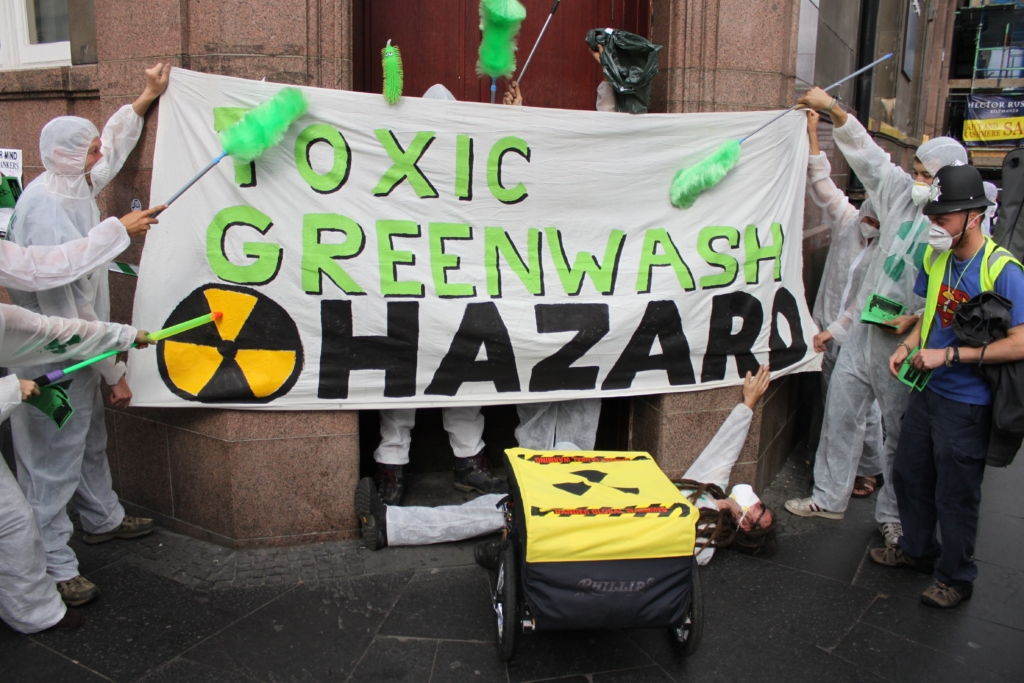Finance Smoke and Mirrors at COP26


Much of the media rhetoric has been around the “finance” of “trillions” as COP26 staggers to a predictable failure. David Whyte explains why this has been, at best, misleading nonsense. The story reflects the fact that most of the COP medias coverage has been dire, ready to ride along with the idea that nothing really has to change. The idea that you can “buy” your way with finance out of our predicament is as weird as the idea that you can “buy” your way with green consumerism.
Last week saw Mark Carney launch the Glasgow Financial Alliance for Net Zero (GFANZ), Carney lamented: “A few years ago, the financial system held a mirror to the climate crisis. Not any more.” Maybe so, but there was something of a smoke and mirrors feel to the conference as he announced an astounding $130 trillion (£96 trillion) deal to tackle climate change, pledged by the world’s major banks and financiers.
Blue Zone/Blackrock
In the “Blue Zone”, on the north bank of the Clyde, behind the high-security cordon where the intergovernmental negotiations were taking place, some familiar climate villains had been assembled. Joining Carney on the alliance panel discussions were Larry Fink of Blackrock, possibly the worlds biggest fossil-fuels investor, and Jane Fraser of Citibank, the biggest investor in coal outside China. Could anyone have been surprised when, after the Carney, Fink and Fraser show was over, Greta Thunberg stormed out of the meeting on carbon offsetting, pleading with delegates to “stop greenwashing”?
Was this greenwashing? Well, it was obvious to anyone who bothered to read the small print that there was no $130 trillion “deal”. All that the $130 trillion figure represented was a crude, back-of-the-envelope sum of the combined assets of all of the signatories. The figure released by Carney and the alliance was a notional one, dependent on a rather stretched leap of faith. The total assets held by signatories amounted to roughly 40 per cent of the world’s financial capital (or something close to £130 trillion). If those signatories no longer invested in carbon projects, then all of their assets could be regarded as “green”. Simple.
Few do read the small print, and we saw some spectacular misreporting. The New York Times headline screamed: “Financial industry, with $130 trillion, to pursue climate goals”; Bloomberg followed suit with: “Carney unveils $130 trillion in climate finance commitments”. He had done nothing of the sort. And they knew it. Michael Bloomberg is, after all, part of the GFANZ inner circle.
Heist
To give Carney his due, he had pulled off a very big heist, in broad daylight, under the spotlight of the international press. But when everyone realised their mistake, it was all too late. A matter of hours after the announcement, the BBC issued a correction – admitting that the $130 trillion was merely a count of all assets – before swiftly moving on to the next Cop26 story… something about Glaswegian schoolkids saying funny things about the summit.
All of this smoke and mirrors may well have been planned for a long time. Yet it is more plausible that this $130 trillion heist was the only press content that Carney could salvage from his failed attempt at a more meaningful deal. In the weeks leading up to the conference, documents leaked to the Financial Times revealed that most of the big banks were refusing to sign the agreement that Carney sought.
This agreement – following the International Energy Agency (IEA) roadmap – would pledge zero carbon by 2050. The reason for the refusal? The IEA roadmap explicitly includes a ban on new oil and gas exploration from 2021 onwards. Less than two weeks before Cop26, with major banks refusing to go down this route, Goldman Sachs boldly announced that it would continue to do business with fossil-fuel companies and would continue financing fossil-fuel developments. CEO David Solomon explained: “If we’re too aggressive … that can be more inflationary.”

Help to support independent Scottish journalism by subscribing or donating today.

The elite class described in the article will never make the changes necessary to keep the planet safe for the simple reason that the changes now need to be so severe that it would, effectively, destroy their class. And so we see, time after time, initiatives that don’t add up, that kick the can down the road, or just peter out.
They have clearly made their decision. The decision is to do nothing meaningful about climate change, maximise profits in the short term, and take their chances in the crash that must surely come. To improve their chances, as things get more unsteady, they are attempting to nudge governments towards greater authoritarianism.
We must resist this and that starts with kicking out vax passports.
Or we work ‘convivially’ to make this authoritarianism more democratic, an expression of the public will (which as good republicans we’re obliged to obey, irrespective of whether we privately agree with it or not) rather than that of the opinion or interest of any individual or class of individuals.
They already live in a different world don’t they ,and in their eyes they are invincible .As the old saying goes the “Higher You Are “